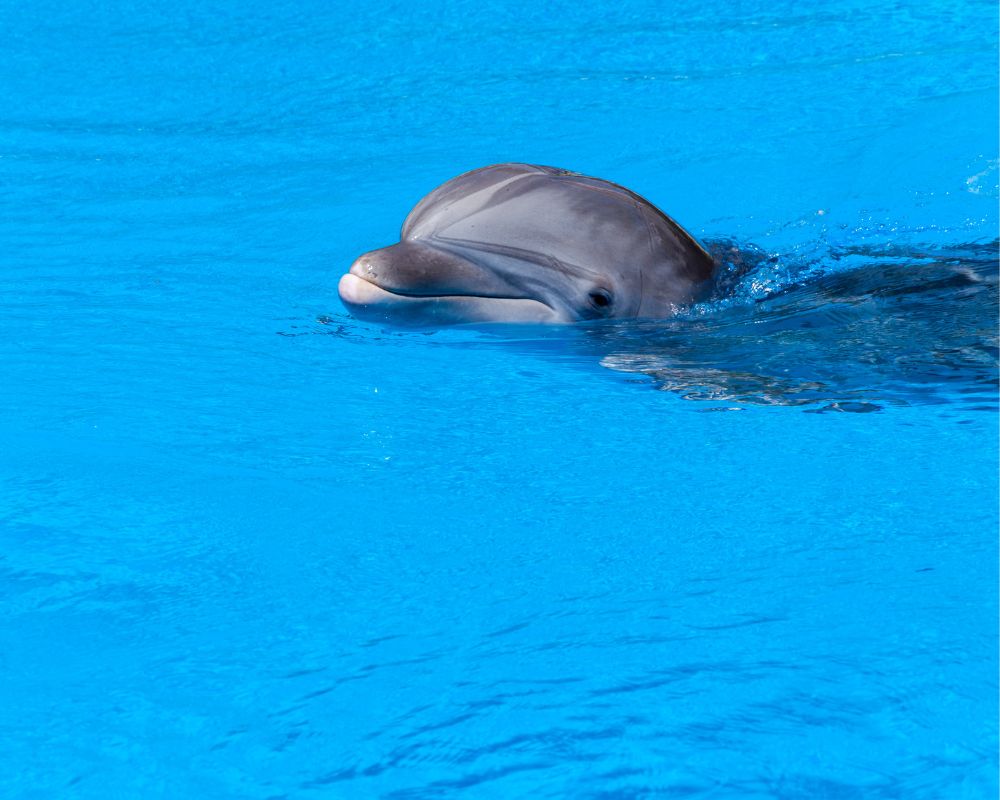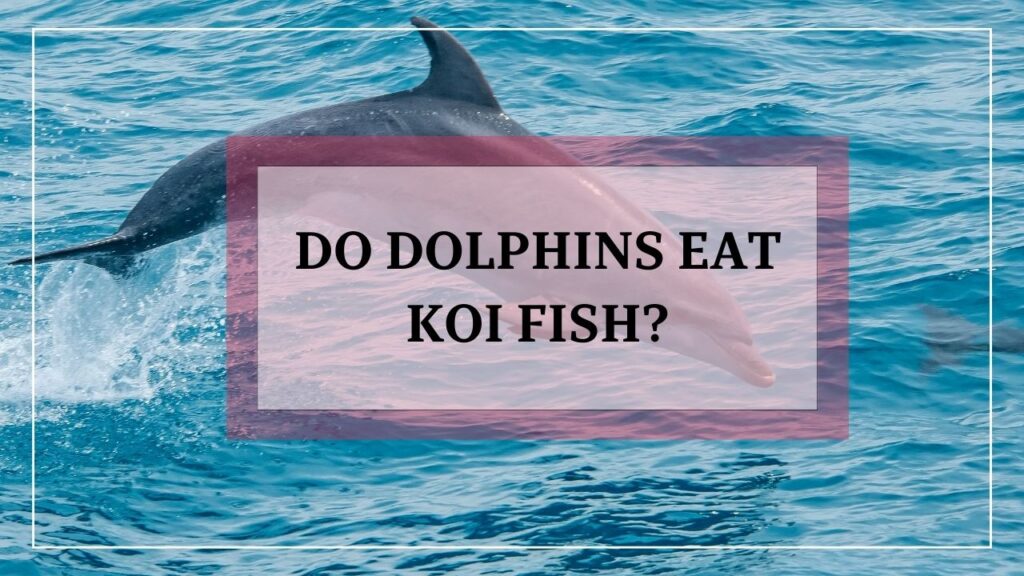Hey there, fellow marine enthusiasts! Ready to dive into the fascinating world of dolphins? Well, get ready for a wild ride because today we’re tackling a question that’s been swimming in the minds of many: Do dolphins have a hankering for koi fish?
Now, we all know dolphins are like the rock stars of the sea, right? With their playful flips and acrobatic leaps, they never fail to capture our hearts. But what about their diets? Are these intelligent and charismatic creatures truly culinary connoisseurs, capable of appreciating the delicate flavors of our beloved koi fish?
Now, let’s dive right in and uncover the truth behind these underwater foodie adventures. Are you ready to satisfy your curiosity and learn about the incredible dining habits of dolphins? Great! Let’s go!
Do Dolphins Eat Koi Fish?

Let’s get straight to the point and answer the burning question: Do dolphins have a taste for koi fish? Well, my friend, the answer isn’t as straightforward as a dolphin’s somersault in the sea.
In short, dolphins generally don’t have a strong inclination for koi fish. While they are carnivorous and enjoy a variety of marine delicacies like fish, squid, and crustaceans, koi fish aren’t typically on their preferred menu.
Dolphins are highly adaptable hunters, targeting prey that is abundant and easy to catch. They evaluate factors such as nutritional value and energy efficiency when choosing their meals. While dolphins may occasionally interact with koi fish, it’s not a common or regular occurrence.
So, if you’re concerned about dolphins raiding your backyard koi pond, fear not! Dolphins have diverse dietary preferences and tend to opt for other fish species that are more readily available and offer greater rewards in terms of nutrition.
Benefits of Eating Koi Fish for Dolphins
So, we’ve established that dolphins generally don’t have a strong penchant for koi fish. But let’s indulge our imaginations for a moment and consider the hypothetical benefits of dolphins including koi fish in their culinary repertoire. Are there any perks to dining on these colorful swimmers? Well, let’s dive right in and explore the possibilities!
Nutritional Value: Beyond The Rainbow Scales
Now, my friend, you might be wondering if there’s any special nutritional value that dolphins could gain from munching on koi fish. While there isn’t a ton of scientific research on this specific topic, we can make some educated guesses.
Koi fish are known for their vibrant colors, which often stem from a diverse diet rich in nutrients. This means that if dolphins were to indulge in a koi fish feast, they could potentially absorb some of those essential nutrients. However, keep in mind that dolphins have access to a wide range of fish species that offer similar nutritional benefits. So, while koi fish might be tasty, dolphins can still maintain a well-rounded diet without them.[1]
Mental Stimulation: A Dash Of Culinary Adventure
Dolphins are highly intelligent beings, and mental stimulation is essential for their well-being. Now, imagine a pod of dolphins encountering a koi fish pond. While koi fish might not be their go-to meal, their presence could add a dash of excitement and intrigue to their underwater escapades.
Engaging with different types of prey, even if they aren’t a staple part of their diet, can provide dolphins with mental stimulation and help satisfy their curious nature. So, in a way, the occasional encounter with koi fish could serve as a culinary adventure, keeping their minds sharp and their spirits high.
Social Dynamics: Making Waves With Koi Fish
Social interactions play a vital role in the lives of dolphins. They are highly social creatures, often forming tight-knit pods and engaging in playful behaviors. Now, picture this: a group of dolphins playfully chasing koi fish through the water, showcasing their agility and coordination.
While the intention might not be a gourmet meal, these interactions with koi fish could enhance social bonding within the dolphin community. Playful activities, like chasing and herding fish, strengthen relationships and promote cooperation among pod members. So, even if the dolphins aren’t necessarily eating the koi fish, their playful encounters could contribute to their social dynamics.
Risks of Eating Koi Fish for Dolphins
Let’s flip the coin and take a closer look at the potential risks involved. While dolphins may occasionally interact with koi fish, indulging in these colorful swimmers could pose a few challenges. So, my friend, let’s dive in and uncover the risks of including koi fish on the dolphin menu!
Size Matters: A Challenging Bite
Koi fish, with their graceful fins and vibrant scales, are quite the eye-catchers. However, they tend to be larger in size compared to some of the fish species that dolphins typically prey upon. This size difference could present a challenge for dolphins when it comes to capturing and consuming koi fish.
Dolphins are strategic hunters, choosing prey that is suitable in terms of size, energy efficiency, and ease of capture. While they possess sharp teeth and powerful jaws, tackling larger prey can require more effort and energy expenditure. So, the size disparity between dolphins and koi fish may deter dolphins from making them a regular part of their diet.
Potential Toxicity: A Rainbow Of Chemical Concerns
Koi fish enthusiasts often go to great lengths to ensure the health and vibrancy of their beloved fish. This may involve using chemicals, such as pond treatments or medications, to maintain water quality and ward off potential diseases. While these measures are essential for koi fish care, they can introduce chemicals that might not be beneficial for dolphins.
Dolphins are highly sensitive creatures, and exposure to certain chemicals or toxins can have adverse effects on their well-being. So, if dolphins were to consume koi fish that have been treated with chemicals or medications, it could pose a risk to their health. However, it’s important to note that responsible koi fish owners prioritize the well-being of their fish and minimize the use of potentially harmful substances.
Factors Affecting Dolphins Eating Koi Fish
So, my friend, let’s unravel the mysteries behind the dolphin’s selective palate!
Availability And Abundance: A Feast Fit For Dolphins
Dolphins are opportunistic hunters, and their dietary choices are heavily influenced by the availability and abundance of prey in their habitat. In the wild, they have access to a wide variety of fish species, squid, and crustaceans. These options often prove more plentiful and easily captured than koi fish found in ponds.
Koi fish are typically found in controlled environments, such as ornamental ponds or backyard setups, rather than in the natural habitats where dolphins thrive. As a result, the likelihood of dolphins encountering koi fish in their everyday feeding grounds is relatively low. So, availability and abundance play a significant role in shaping their dietary preferences.
Environmental Factors: Beyond the Koi Pond
Dolphins are highly adaptable creatures, and their dietary choices can also be influenced by their specific environment. Factors such as water temperature, salinity, and the presence of other prey species play a role in shaping their feeding habits.
Koi fish are primarily associated with freshwater environments, while dolphins predominantly inhabit saltwater or brackish habitats. The difference in environmental conditions can limit the encounters between dolphins and koi fish, further influencing their likelihood of indulging in this particular culinary delight.
Conclusion
In conclusion, while dolphins may occasionally interact with koi fish, they generally don’t have a strong inclination for these colorful swimmers. Their dietary choices are influenced by factors such as availability, nutritional value, efficiency, and environmental conditions. Dolphins have a diverse range of prey options in their marine habitats, and koi fish are not typically at the top of their menu.

